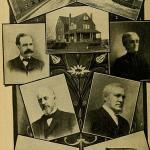That’ll work.
A number of people who self-identify as evangelical are worried about the brand. Some even offer advice for making evangelicalism better. The problem is that evangelicalism does not and has never erased or absorbed differences among Protestants. Did the new birth that George Whitefield advocated placate Congregationalists who feared enthusiasm or Presbyterians who wanted preaching to occur under the oversight of elders? Did Charles Finney’s new methods unite John Williamson Nevin’s German Reformed Protestants or Charles Porterfield Krauth’s Lutherans? Did the evangelicalism of Billy Graham even harmonize mainline and fundamentalist Protestants? Drum roll — no.
So why can’t we give up evangelicalism and simply go back to our own congregations, communions, or denominations and simply be Baptist, Presbyterian, Swedish Pietist, or [insert name of megachurch network here]. That’s what I proposed once upon a time:
If evangelicalism were merely a construction of 1940s progressive fundamentalists, later tapped by academics and political strategists, what would happen if Americans decided to give up the label? Say, a new government agency that regulated religious language called for a moratorium on the use of the word evangelical by scholars, religious leaders, and believers alike; what damage would be done to either the United States or to Christianity? In a worst case scenario, what would be the harm of admitting that evangelicalism does not actually exist, and that it is an abstraction to appeal to a variety of different Protestants for certain religious and social ends? The damage done to institutions like Christianity Today, Fuller Seminary, and the National Association of Evangelicals might be great. But these bastions of the post-World War II neo-evangelical movement have long since come to terms with the limitations of the original 1940s project. Popular evangelical voices like Chuck Swindol, Charles Stanley or James Dobson might also feel a sudden pinch if the evangelical label were not available to them. Still, Swindol and Stanley are ministers in specific denominations (Evangelical Free Church and the Southern Baptist Convention respectively) and their radio broadcasts could well find listeners without an evangelical benediction. In addition, Dobson’s membership in the Church of the Nazarene would not necessarily restrict his advice to parents and spouses any more the Dr. Laura Schlesinger’s Jewish identity hurts her appeal to radio listeners across the United States. So, aside from these “evangelical” outlets, would it be so bad to refer to Protestants in the United States by their church membership, from Baptist and Methodist to Lutheran and even the Willow Creek Association?
For most Americans who public opinion surveys identify as evangelical the damage done by the moratorium proposed here would be negligible. This is a point that reinforces the notion that evangelicalism as a religious identity is at best vague and at worst hollow. For most Christians in the United States, their week-in, week-out spiritual lives are grounded in a local congregation of believers with ministers and church leaders who try to feed the local flock with the truths of God’s word as best they can. These congregations are sites of real, though flawed, Christian ministry, where members gather together every week in the presence of God to offer up praise and petitions and to receive the good news of the gospel through preaching and the celebration of sacraments. These churches are also places where diaconal assistance is provided, the advice and warnings of discipline rendered, and fellowship among the saints is available. Churches sponsor pot luck suppers in all of their glory (e.g burrito casserole) and ignominy (e.g., the deacon with the bad hair piece as a dinner companion). Parachurch “ministries” don’t render such services because they cannot. The worst that could happen to these believers is that they would not have a collective sense of being part of something big, like an evangelical movement. But removing that sense could be a blessing if it encouraged believers to recognize all the ways in which the local church (and sometimes the parent denominations) ministers to them and provides the real stuff of a Christian identity.
An additional advantage of abandoning evangelicalism as a religious label might be a better recognition of the fullness of Christian teaching. Post-World War II evangelicalism has thrived on a minimalist account of the Christian faith — a seven point doctrinal affirmation in the case of the National Association of Evangelicals, a lot of excitement over the nature of biblical inerrancy, a stress upon a personal relationship with Jesus usually begun by a dramatic conversion experience, or the pious rush that comes from listening to one’s favorite Christian recording artist. This sort of religious minimalism is appropriate to the construction of a coalition or movement. What are some of the basic teachings or practices that Christians share in common and can these function as a basis for collective endeavor?
Ironically, the evangelical movement’s search for a “mere” Christianity runs directly counter to one of born-again Protestantism’s favorite verses in the Bible. The text that has inspired evangelistic crusades, radio broadcasts, Jesus Rock and foreign missions, Christ’s Great Commission in Matthew 28:18-20, actually contains more than a command to spread the good news. In addition to saying, “Go therefore and make disciples of all nations,” Christ adds, teach “them to observe all that I have commanded you.” A minimalist reading of the word “all” in that phrase would at least require teaching everything Christ taught in the four Gospels. A maximalist rendering would involve the entire contents of the Bible since the Word Incarnate is the author of the Word Inscripturated. Either way, the Great Commission requires more than the search for minimal affirmations and warm sentiments that have driven the construction of twentieth-century evangelicalism. Indeed, the Great Commission has all the makings for the kind of tradition building that historic Christian communions have attempted and that born-again Protestantism has congenitally avoided.
As much as I appreciate Chris Gehrz’s suggestion that pietism might be a substitute for evangelicalism, it also lacks a recognition that his own communion, the Evangelical Covenant Church, has its own history and ways that could never satisfy the Southern Baptists, Free Methodists, Pentecostals, and black Baptists that try to fit under the umbrella of “evangelicalism.” It’s a bit like saying, come to the Orthodox Presbyterian Church. For many Protestants, the OPC is no substitute for the kind of worship, ministry, and networks that inform their identity.
But that’s just another way of saying that evangelicalism doesn’t substitute for the Evangelical Covenant Church or the OPC. Communion matters. Movements don’t. To enter identify as an evangelical is to leave a lot at behind.
So let’s give up evangelicalism. Let Protestant diversity be Protestant diversity.












